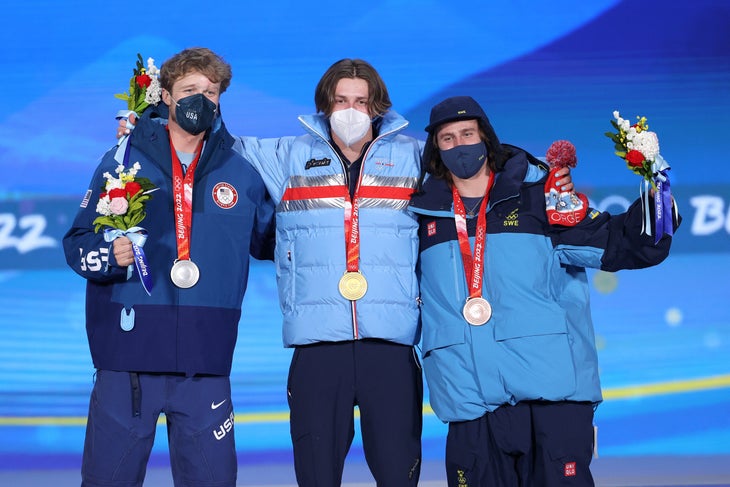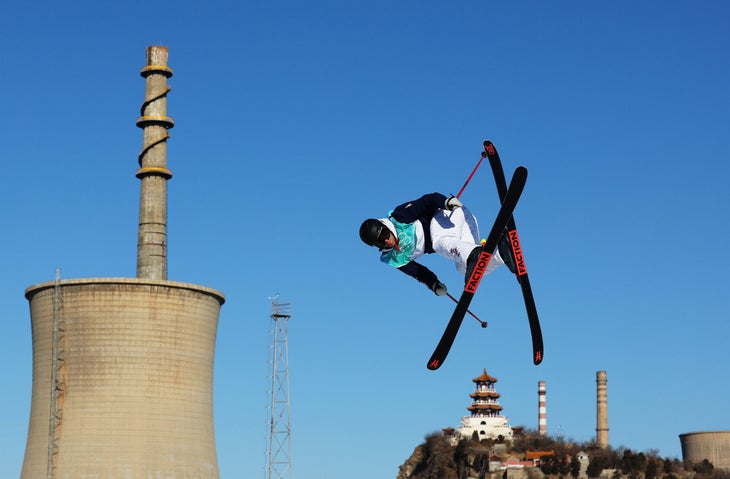Products You May Like
Receive $50 off an eligible $100 purchase at the Outside Shop, where you’ll find gear for all your adventures outdoors.
Sign up for Outside+ today.
Ski big air is here to stay. The single-trick huck-fest isn’t just about timing, air sense, and gymnastic execution. The new Olympic event is an exquisite feast of high-stakes decision-making. The women’s gold medalist Eileen Gu of China proved it on Tuesday by throwing the first 1620 of her life when it mattered the most, and on Wednesday, American Alex Hall threw the only 2160 in the men’s competition—missing a medal—while his teammate Colby Stevenson used savvy tactics and took silver.
Also Read: U.S.-Born Eileen Gu Stuns With New Trick to Win Gold For China in Women’s Big Air
In the end, Birk Ruud of Norway claimed gold in the 12-man final in which so many skiers went so big that they nearly overshot the landing in front of the dirty concrete cooling towers at Shougang industrial park.
Ruud entered the final as the top qualifier, but he knew that nothing was a given. He had lost his father to cancer in April 2021 and suffered a knee injury 10 weeks ago that kept him off snow for a month. While rehabbing his knee, he could only visualize the Olympic trick he had been planning for an entire year: a switch triple cork 1980. In his first attempt, he spun five-and-a-half revolutions 25 feet in the air and snagged 95.75 points, the highest score of the day.

“It was my third time doing it.” Ruud said of the trick. “I’ve been practicing it for almost a year inside my head. That’s how powerful mental training is. I’m stoked to prove that.”
If Ruud’s score had been threatened, he had planned to throw a 2160. “Next time,” he said. Having already secured the gold medal after his second run, Ruud used his third run as a victory lap, throwing a 1440 for fun with a Norwegian flag in one hand. The judges approved the effort with a cheeky score of straight 69s across the board.
Meanwhile, Park City’s Colby Stevenson used his second run to redo the triple cork nose butter 1620 with a Japan grab that he’d washed out on landing in run 1. His second-run score (91.75) lifted him into medal contention.
“If I had missed that second jump, I would have been out of the running,” Stevenson said, “so that was a big relief. The last jump, I was still deciding what to do when I was clicking into my skis. I went with something I knew I could do, grab, and land clean.”
More: Follow SKI ‘s Coverage of the Beijing Olympic Games
Stevenson’s stylish switch 1800 stale grab scored a 91.25 and the total of his best two runs held up as three of the last eight skiers crashed, including Italy’s Leonardo Donaggio, whose wipeout guaranteed a U.S. podium with only two skiers to go: Ruud, and Henrik Harlaut of Sweden, 31, who placed third.
For Stevenson, who is better known for his slopestyle skills, the Olympic silver was his first medal in big air.
“Every dog has his day,” he said. “I couldn’t be more grateful and more surprised, honestly.”
Four years ago, Stevenson missed the Olympics with a torn rotator cuff and felt “super gutted.” So when he made the U.S. team for Beijing and advanced to Wednesday’s final, he called it “a dream come true.” But really, he said, “I’m living out my bonus years.” In May 2016, he shattered his skull in a horrific car accident. He was driving from Oregon to Park City, briefly fell asleep at the wheel on the interstate, and rolled his friend’s truck about eight times in eastern Idaho. In addition to the traumatic brain injury, he also fractured his eye socket, jaw, neck and ribs at 18 years old. Yet eight months later, he won his first slopestyle World Cup in Italy.
“It’s been a long road for me since that car crash five years ago,” Stevenson admitted. “It is a thing in the past. I don’t want to think about my skull being all bashed in, because, ugh, maybe this is risky. Work with what you got, you know? I’m 24 years old and I’m still learning tricks at every event.”

Hall, the 2022 Winter X Games Big Air champion who attempted the 2160, said, “I’m stoked that I went for it, hyped just to try.” Hall made the decision after he watched his name slide down the leaderboard as other skiers increased their total scores on run 3. So in addition to spinning six rotations, he added a difficult two-handed Buick grab to the trick, but ran out of air time, crashed, and finished eighth.
Hall’s U.S. teammate Mac Forehand placed 11th, and three-time Olympian Nick Goepper placed 22nd after failing to qualify for the final.
Goepper said after the qualifying round, “I took a big swing and just went a little too big. Slopestyle’s more my specialty, so I look forward to getting out to the mountains.”
Goepper and the rest of the U.S. big air team will contest Slopestyle on Feb. 14-15.
